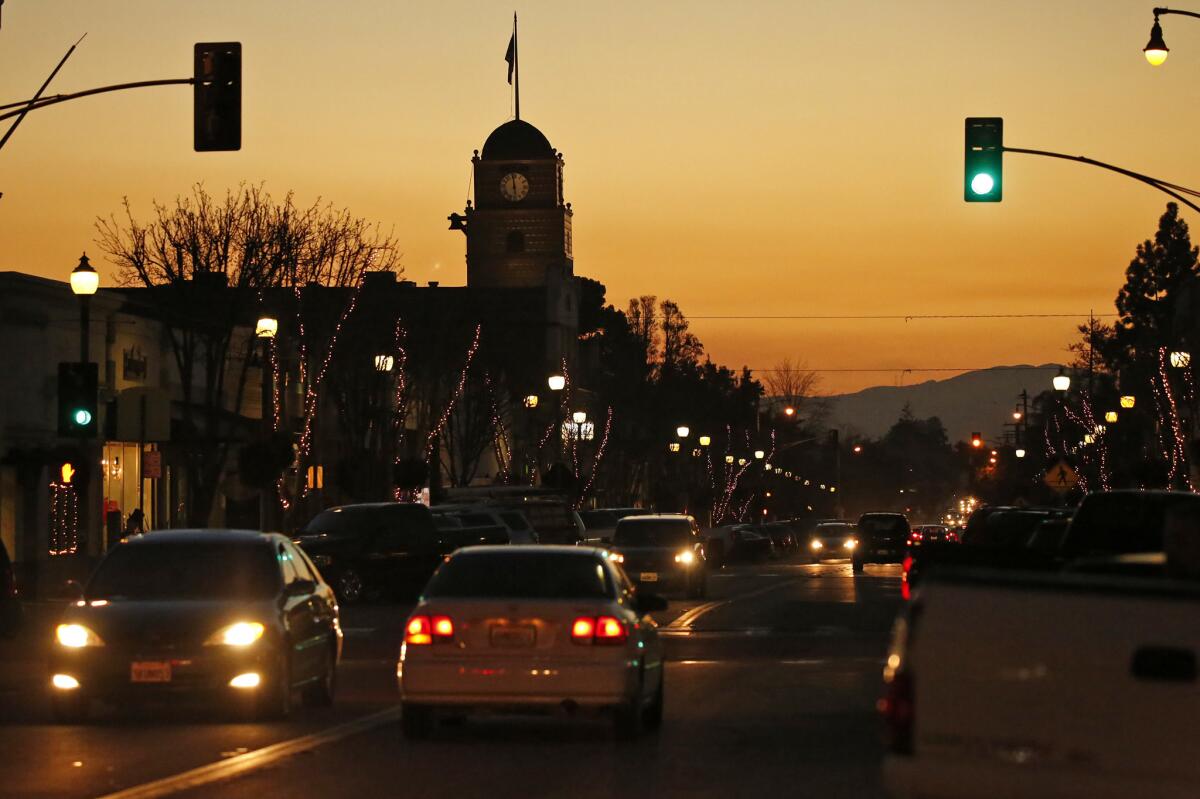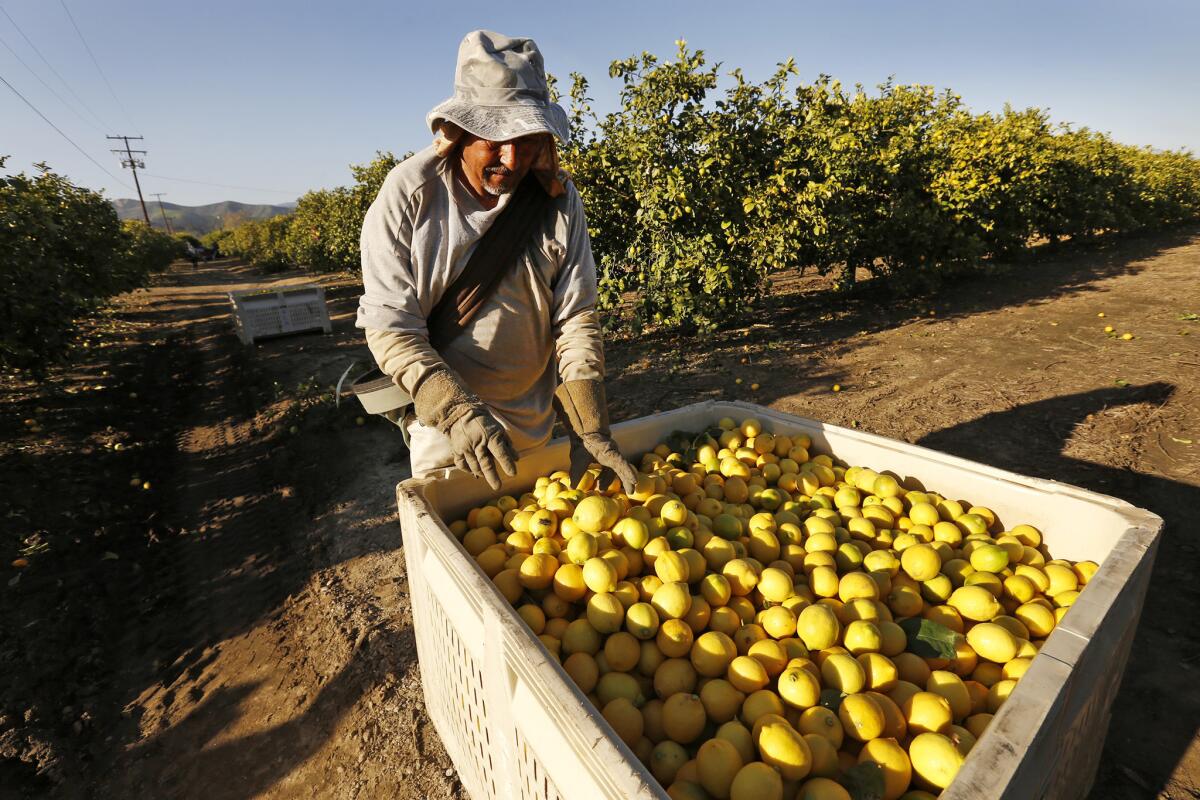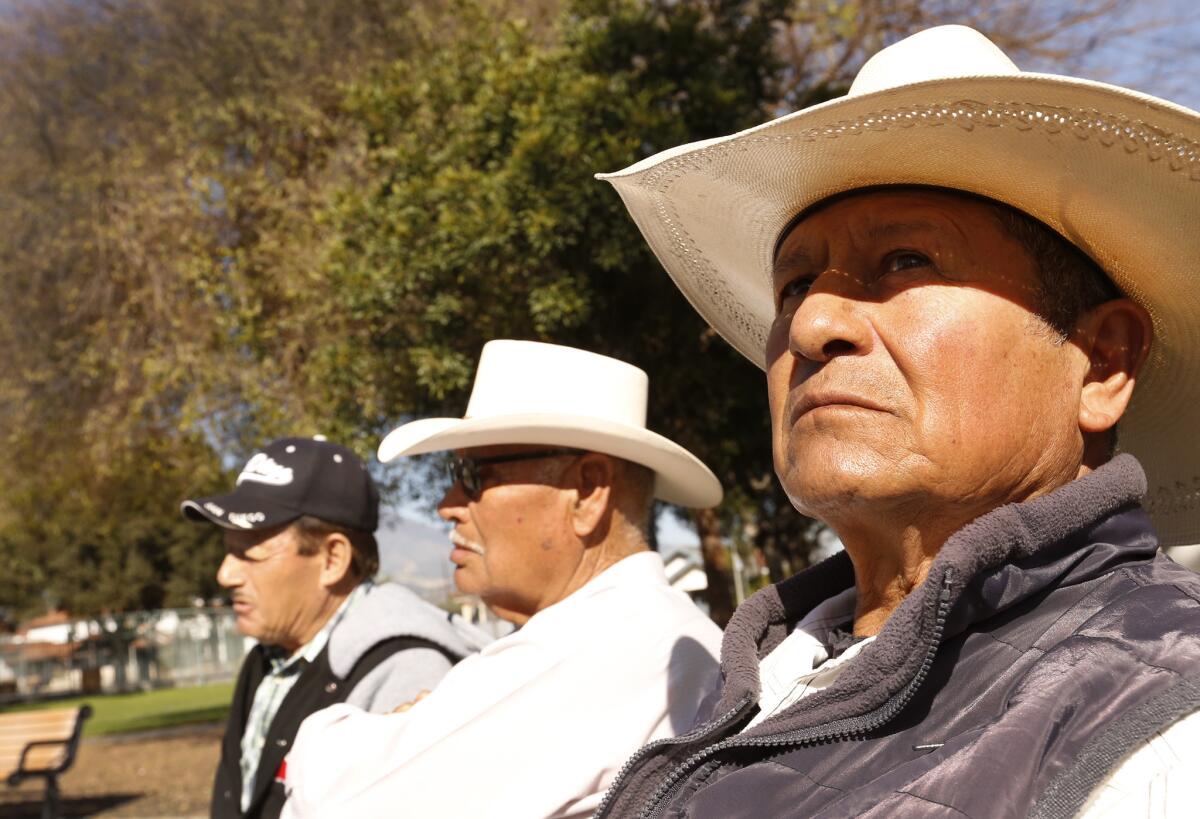Gripped by fear of ICE raids and deportations, one town tries to separate fact from rumor

- Share via
Reporting from Santa Paula — The housekeeper panicked when she heard about Immigration and Customs Enforcement agents descending on Santa Paula.
The 40-year-old, a Mexican immigrant in the U.S. illegally, called her boss and asked for that Friday off.
When she returned Monday, another housekeeper had already taken her place.
The raid left the woman — who asked not to be named out of fear of being targeted — and other immigrants in the U.S. illegally struggling to separate fact from fiction in the President Trump era.
“How do we know the right information?” she asked. “All the fear that I feel and then I find out that this is not true.… We need to have the truth.”
Santa Paula offers a window into the fear, uncertainty and confusion that have gripped heavily Latino immigrant communities since Trump took office. The president has vowed a big increase in deportations of those in the country illegally, but his administration has yet to provide firm details of his plan.
That has created a vacuum where rumors, social media hoaxes and neighborhood gossip can pass for facts and stir panic.
Word of the sweeps had come from the Coalition for Humane Immigrant Rights of Los Angeles, or CHIRLA, a Los Angeles-based immigrant rights organization that said Santa Paula was one of several locations being targeted by ICE.
But Santa Paula’s police chief, Steven McLean, said there were no ICE arrests in his town and criticized activists for heightening fears during anxious times.
“What it did was unnecessarily cause fear in my community when they could have simply picked up the phone,” he said, and “called the chief of police — who happens to be Latino — and hear it from me instead of just putting out that press release that just caused all kinds of fear in the Hispanic community.”
Fields stretch back in tidy rows in a town self-proclaimed as the “Citrus Capital of the World.” Workers, concealed among the trees, fill collection bags with lemons before dumping them into crates, their hands moving faster than the beat of the Spanish music that serves as their soundtrack.
In the town, nestled in the rich, agricultural Santa Clara River Valley, more than one mural — and a town monument — feature farmworkers. Along Main Street, Spanish and English intermingle, with business marquees.
Santa Paula is about 80% Latino and although it is unclear how many of them are immigrants without legal status, an estimated 31% of the city’s population is foreign born.
Mayor Jenny Crosswhite said the city has maintained its charm and small-town feel, a place “where everyone is looking out for each other.”
When the CHIRLA alert began to circulate, Crosswhite fielded phone calls, emails and texts from community members questioning whether it was true.
The night after the release went out, a mother called the Santa Paula Police Department saying she had seen on social media that immigration officers were at the Boys & Girls Club.
The following week, a college student told the police chief he had heard that ICE was at the Department of Motor Vehicles. (It turned out they were local police officers).

“People were definitely at a level of heightened anxiety,” Crosswhite said. “But it feels like everything is at a certain level of heightened anxiety — not just around this particular issue.”
Inside Melissa’s Beauty Salon, customers and staff were well aware of rumored ICE sweeps. Fear had settled in the area when Trump came into office, they said, and word of raids only increased it.
“People don’t want to come out anymore,” said Bertha Cortes, the salon owner. The weekend after the CHIRLA alert circulated, the normally full laundromat nearby was empty, Cortes said.
Vanessa Bugarin, a beneficiary of the Obama administration’s immigration relief program — Deferred Action for Childhood Arrivals, better known as DACA — said her parents are in the country illegally. The 18-year-old said that after the alert went out, her family had a conversation about what to do if immigration officers came to the door.
“This is a community of people who are immigrant workers,” Bugarin said from her seat in the salon. “It’s logical with the president that we have and the circumstances that we’re going through that people fall into that category of fear when you hear those kinds of things circulating. It’s kind of a self-protection kind of thing.”
Some community organizers have taken upon themselves to fact-check the rumors.
Laura Espinosa, one of the founding members of the city’s Latino Town Hall and the Ventura County district director for the League of United Latin American Citizens, said that when the ICE rumors started, she talked to McLean, the police chief. He told her that local police had not been notified of any ICE sweep.
“In normal times, law enforcement would be notified. These are not normal times in our minds,” Espinosa added. “We’re not taking everything at face value. We really want to substantiate reports — official and nonofficial.”
Espinosa gathered with a handful of Latino organizers in the community on a recent weekday outside Casa del Mexicano, which was established years ago with the intention of providing a safe haven for newly arrived immigrants.
Groups within the county are in contact and holding know-your-rights workshops, as well as considering creating a text based messaging system that could get out information on resources and that could possibly dispel false rumors.
For advocates at CHIRLA, any mistake made in putting out the alert — which went viral — had to be weighed against what they called a dramatically heightened risk of mass deportations because of Trump administration policies.
“We trust our attorneys, we trust their information and had we been advised by ICE early on of where exactly they were conducting their operations, I don’t think that we would have had to do any type of guesswork,” said Jorge-Mario Cabrera, a spokesman for the organization. “I think we are quite responsible and I stand by what we wrote originally. Whether or not we were off by a few cities, I’m not apologizing about that at all.”
Although there was a five-day enforcement operation that occurred the week that CHIRLA put out its alert, spanning Feb. 6-10, arrests were made in Oxnard, Ventura and Camarillo — not Santa Paula, according to federal immigration officials.
This week, the White House lifted nearly all restrictions on removing 11 million people in the U.S. illegally, marking a vast expansion of the federal government’s deportation priorities.
That has given an added layer of credibility to fast-spreading digital messages about deportations, sweeps and checkpoints — whether they turn out to be true or not.
“You can tell them that you need better mechanisms to pay attention to fear and not panic,” said Manuel Pastor, director of USC’s Center for the Study of Immigrant Integration. “But there’s every reason — if 8 of 11 million people are threatened by new enforcement priorities — to think that’s a threat.”

On Valentine’s Day, six men gathered at Veterans Memorial Park, where the retired Santa Paula residents typically meet each day.
They shared what they had heard about ICE, including a rumor about arrests in a restaurant in nearby Fillmore.
“I heard they took 17 people,” one man said to the others, one of whom had Mexican and American flags attached to the back of his motorized wheelchair.
“I don’t think that’s true,” Jesus Rodriguez, 73, responded from his perch on a bench.
Restaurant staff told The Times that ICE did not make any arrests there.
But with all the things going on in the country, Rodriguez said, it’s hard to tell what is fact or fiction — or something in between.
“You only hear things,” he said. “But you never know if they’re telling the truth or they’re telling lies.”
Times staff writer Sandra Poindexter contributed to this report.
For more California news, follow @brittny_mejia
ALSO
More than 50 detained in immigration raids at Asian restaurants in Mississippi
One comment from Trump shows his administration’s message on immigration has been muddled
More to Read
Sign up for Essential California
The most important California stories and recommendations in your inbox every morning.
You may occasionally receive promotional content from the Los Angeles Times.











